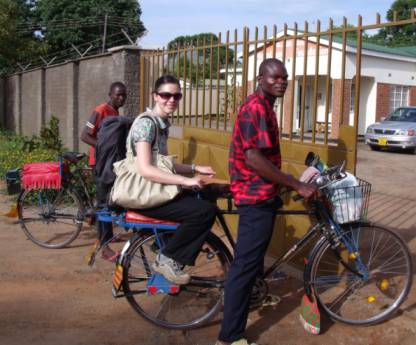Part of what we’re also looking at with the Social Performance Management work we’re carrying out here at MicroLoan Foundation (MLF) is protecting the clients from over-indebtedness. One way in which this is currently addressed is by the savings clients have to have as a deposit in order to access a loan: 10% for their first loan and 20% for subsequent loans. This ensures clients are taking loans that are appropriate to their means. Another way is the group themselves. If they feel that a client is asking for a loan that’s too high, they will step in and suggest she reduces the amount requested. For example, they would know that she might have struggled to pay her loan back in the last cycle because, say, there was an illness in the family, so would advise she does not put undue pressure on herself in the next loan cycle until her family situation has settled down again.
In addition to this, we’re also looking at how business assessments might be integrated into MLF’s operations. These would give further insight into the relationship between the client’s business and her ability to repay her loans. I’ve therefore been trialling the methodology and in the process have gained some fascinating insights into what it means to be a MLF client and small businesswoman. I’d like to share just one client’s story with you now…
Magret Msimuko is a widow and on her 6th loan from MicroLoan. She is based in Nkamenya, a small trading town in the Central Region of Malawi. Her first four loans were spent her business of trading chitenjes (the colourful cloth used as skirts) in the local villages for maize. The maize she would then sell in the market-place. Before setting out she would work out how much maize she needed to trade for the fish and cloth in order to ensure she made a profit. It was hard work, and involved walking long distances between villages to carry out her trading business, but she made a profit, was able to send three children (one of whom is an orphan) to secondary school and make regular savings into the MLF group savings account.
Recently in her 5th cycle, she decided to change her business to a small restaurant which doesn’t require her to spend her days walking. It’s based in the bustling main market centre of town, and she serves tea and scones, as well as the staple nsima (made of maize) with vegetables and meat or beans. With the two most recent loans she has set the business up, buying tables, chairs, pots and plates as well as the necessary food-stuffs and fuel. Though she set up in the rainy season, a difficult time of year before the harvest when people are at the most vulnerable to food insecurity and don’t have much money, she is optimistic that now the harvest is in full flow the business will start to take off.
.jpg)
No comments:
Post a Comment